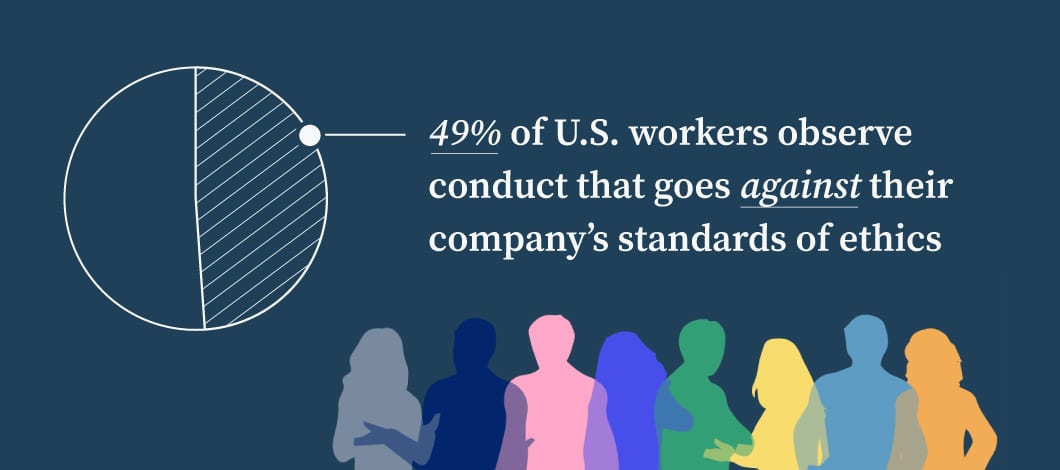Ethical issues in business can be an unforeseen and difficult challenge.
Discrimination laws and other statutes are in place to keep workers and employers responsible, but they can’t wholly deter employees or employers from acting unethically.
We’ve compiled a list of current ethical issues in business that you might have to confront. Understanding how to detect and, most importantly, deter these issues before they become a problem can keep your focus on business growth instead of remediation.
Here are the business ethics topics we’ll cover:
- Discrimination and harassment
- Abuse of leadership
- Compliance
- Accounting
- Employee theft
- Social media
- Data privacy
- Nepotism
What Are Ethical Issues in Business?
When referring to ethical issues in business, the meaning essentially comes down to what’s seen as morally right or wrong within an organization and in the eyes of the public, not limited to customers and shareholders. These issues can take the form of company actions, employee activities and business decisions, among others. At the core, they demonstrate character, trustworthiness and integrity (or lack of).
Ethics and Compliance Statistics
Just how prevalent are ethics issues in business? The Ethics & Compliance Initiative released its 2021 Global Business Ethics Survey Report. Some of the most striking statistics included the following:
- 49% of U.S. workers note observing conduct that goes against their company’s standards of ethics
- The most prevalent forms of misconduct in the U.S. include favoritism, management lying to employees, conflicts of interest, improper hiring practices, abusive behavior and health violations
- 86% of U.S. workers report misconduct within their organization
- 30% of U.S. employees say they feel pressured to compromise their company’s standards of ethics
- 85% of employees working for companies with a culture emphasizing strong ethics note favorable outcomes
- However, the global median of companies with strong work cultures is just 14%

8 of the Top 21st Century Ethical Issues in Business Today
Ethical and moral issues in business aren’t new, but fresh technologies can be a breeding ground for new forms of unethical behavior. Additionally, the way companies handle such concerns can evolve. Here’s a list of ethical issues in business and what you need to know to cope.
1. Discrimination and Harassment
Harassment and discrimination are arguably the most prominent contemporary ethical issues in business today. Should an instance occur, the result could be devastating to your company’s finances and reputation.
Though discrimination and harassment laws have been put in place and continue to be updated, thousands of businesses see complaints levied against them each year. According to the United States’ Equal Employment Opportunity Commission (EEOC), there were 61,331 charges filed in 2021 alone.
Although discrimination and harassment policies in business settings technically deal with different treatment types, both protect certain classes of employees.
To help combat ethical issues in your business specific to discrimination and harassment, ensure your policies don’t negatively impact the following protected classes:
- Age: This usually applies to those 40 and older, but any ageist policies or treatment is prohibited.
- Disability: Anyone with a physical or mental impairment. Employers must grant reasonable accommodations and provide equal treatment to a person with actual or perceived disabilities to comply with the Americans with Disabilities Act (ADA).
- Genetic information: Employers can’t discriminate against employees based on information from genetic testing, and this extends to their family’s medical history.
- Race/color: Employee treatment must be consistent regardless of race.
- National origin: An employer can’t discriminate based on a person’s actual or perceived national origin or ethnicity.
- Religion: Accommodations and equal treatment must be provided within reason regardless of an employee’s religion.
- Sex: Employee treatment must be consistent regardless of sex or gender identity. This includes the following circumstances:
- Equal pay: Compensation for equal work must be equal regardless of sex, race, religion, etc.
- Pregnancy: Accommodations and equal treatment must be provided within reason for pregnant employees.
Workplace Discrimination
Discrimination can be any treatment that negatively affects an employee in a protected class when it comes to the job itself. This includes hiring and retention practices, compensation, advancement opportunities, training and reasonable accommodations, among other workplace treatment.
One of the more significant ethical issues in business is the gender wage gap, where an employer pays a woman less than a man when they have mostly equal skills and experience levels and are performing the same work. Other ethical issues in business examples include firing an employee for being perceived as too old or refusing to provide opportunities for advancement for people of certain races or ethnicities.
Workplace Harassment
Harassment, unlike discrimination, is an ethical issue that involves the social and personal treatment of people within a business. This list of ethical problems includes behavior that creates a hostile work environment, such as teasing, inappropriate sexual behavior and even verbal or physical abuse by a supervisor, co-worker or non-employee. The bullying of an employee with a physical or mental disability would be an example of workplace harassment.
How to Deter Harassment and Discrimination In Your Small Business
Unfortunately, small business owners can’t always make sure employees act ethically. However, what you can control is how your business accommodates and treats its employees of different backgrounds and abilities.
A few things you can do to ensure a healthy, friendly work environment for all include:
- Putting strong company policies in place for human resources and conflict resolution
- Providing continued education on harassment and discrimination laws
- Monitoring employee relationships to stay informed and catch any ethical violations before they become a larger problem
- Ensuring employees who bring forward complaints are shielded from retaliation
2. Abuse of Leadership
Another example of ethical issues in business is abuse of leadership. This occurs when individuals who hold positions of power in an organization misuse their authority, whether with staff members or in relation to their administrative functions.
In addition to harassment, this could present in the punishment of employees who fail to meet unreasonable goals the manager has set. Alternatively, the manager may take credit for the work of a lower-level employee.
Beyond a leader’s interactions with employees, abuse of power can take the form of falsifying reports, including sales, expense or payroll reports. Additionally, it could involve accepting gifts from clients or vendors when the organization has a policy against such action.
Deterring Power Trips
Be sure your company handbook clearly defines acceptable and unacceptable behavior in the workplace. Outline consequences for abuses of power. Additionally, provide leadership training so administrators can learn how to manage themselves and their team appropriately. Finally, intervene when necessary to quash destructive behavior.
3. Compliance
Compliance ethical issues in business are often tied to companies straying from the rules and laws of conducting business. Businesses are required to comply with all environmental, federal and state regulations. If they don’t, they can jeopardize the health and livelihood of those within and outside of their company.
Some businesses knowingly disregard these regulations to improve profits. An ethical issue in business example regarding compliance is a company that illegally dumps its waste. The company knows it’s wrong but does it anyway because it reduces the cost of finding safe alternatives.
Guarding Against Compliance Issues
To avoid compliance problems in business, enact the following practices:
- Always follow governmental and company bylaws.
- Promote a culture that puts the long-term health of the company ahead of short-term greed and self-interest.
- Maintain awareness and adherence to any regulation or statute changes that can impact your business’s operations.
- Stay focused on how actions affect others.
- Always act ethically and in the company’s best interest.
4. Accounting
Another ethical issue in entrepreneurship and business can deal with accounting. Numbers don’t lie. But when accountants and companies act unethically, they do.
Deceiving shareholders and others with a stake in your company’s finances is a serious offense by both ethical and judicial standards.
Penalties can be levied in fines, imprisonment and can often lead to a company’s closure. As an example, in the accounting realm, one of the most infamous business ethics issues in the news was the Enron scandal in 2001, in which company executives used questionable accounting practices to conceal financial troubles and give the appearance of higher profits.
Avoiding Accounting Violations
It’s crucial to have a trusted, honest accountant (or accounting team) who will pore over every number to make sure your records are correct. You should have a part in reviewing every financial statement and report in your company. Also, having an audit system, either internally or externally, for additional oversight can help you avoid ethical problems in your business.
5. Employee Theft
Business owners, especially those in the retail industry, are very aware of how theft can affect their business. Theft is not, however, strictly committed by customers. It’s estimated that 25%-40% of workers steal from their job. Additionally, according to the Association of Certified Fraud Examiners, companies can lose 5% of their annual revenue to employee fraud.
It is not just stealing inventory. Employee theft also includes other ethical violations that can hurt your company.
Some of the ways employees steal from their companies include:
- Money: Stealing money is the most common type of employee theft.
- Time: Falsifying time sheets is another form of employee theft.
- Supplies: Taking office supplies home, such as pens, notebooks and other property, is an additional way employees steal from a company.
- Information: Stealing company information, trade secrets or client information is a form of workplace theft as well. This could put the business at a risk of loss and open it up to competition or litigation.
Preventing Employee Theft
Help avoid business ethics concerns by being thorough in your hiring process. Make certain you trust the employees you’re bringing in and ensure they will be respectful of your company’s property.
You should also have a policy delineating what constitutes theft and the potential consequences for anyone caught stealing. Employees should read and agree to this policy before starting work at your company. A legally enforceable nondisclosure agreement could also help deter the theft of trade secrets or intellectual property.
6. Social Media
A recent ethical issue in business is social media use, whether you and your employees are on or off the clock. Needless to say, your business should have a social media policy addressing do’s and don’ts when employees work with the business’s social media accounts.
Ethical issues to address in a business social media policy include how to:
- Properly seek permission for use or attribute content taken from another creator
- Handle copyrighted content
- Deal with unhappy customers
- Manage public relations concerns
- Use (or not use) personal social media accounts during working hours
While you usually wouldn’t police an employee’s personal social media behavior during non-working hours, their posts could still cause ethical problems in your business. If an employee’s written post, photo or video — even if it was created off the clock — risks damaging your business’s reputation and losing customers and clients, the employee could still face professional repercussions.
Social media ethical issues in business examples include:
- Posting negative or derogatory comments about your business — including anything libelous or defamatory
- Leaking private information about the company or its clients or customers
- Harassment
- Posting content that denigrates an individual or group based on race, sex or gender, religion or disability
How to Manage Social Media Ethics
A clear, consistently enforced social media policy can help keep some business ethics concerns at bay. Have employees read and agree to your business’s policy when they onboard. Social media also rapidly evolves, so update your policy to reflect relevant changes to the landscape, looping in your employees as you do. Include ethical dilemma examples in your business social media policy to help illustrate behavior your company won’t tolerate.
7. Data Privacy
In a digital world, data privacy is at the forefront of ethical issues today in business. Your business and customer information is largely stored on computers, other smart devices or the cloud, and a shoddy IT governance policy can be just as damaging to privacy as a security hack.
Guarding Against Data Privacy Ethical Problems in Business
Maintaining data privacy is paramount. Consider using the following methods to avoid ethical issues in your business:
- Enact clear guidelines regarding how data is handled, stored and purged.
- Identify who manages and/or accesses data and ensure they understand how it should be managed; have them sign a contract affirming this.
- Establish and enforce clear consequences for data privacy breaches.
8. Nepotism
Hiring family members or friends isn’t necessarily a negative. Recognizing when it’s an ethical issue in business comes down to understanding when nepotism supersedes competency and shows unwarranted favoritism.
Additionally, keep in mind, depending on your relationship, the familiar hire may ask favors from you that may conflict with your organizational standards or codes of conduct, such as requesting unreasonable amounts of time off.
Avoiding Unfavorable Outcomes When Hiring Family
Show caution when hiring family or friends, and understand that your existing employees may look upon this negatively, particularly if the individual isn’t qualified to take on the role.
Addressing Ethical Issues In Your Business
Avoiding ethical issues in your business starts at the top. Being a strong leader encourages employees to follow in your footsteps. Weigh decisions against a robust code of ethics and demand the same from your employees.
Use these final tips to avoid ethical issues in your business:
- Ensure policies outlining ethical behavior are known and understood within your organization.
- Learn more about discrimination laws in your state.
- Read up on rules and regulations that affect your industry and make sure your business acts accordingly.
- Work with accountants to maintain transparency and honesty in your financial reports.
- Set up a confidential system for reporting ethical violations.
- Offer employee training and resources to combat unethical behavior.
If you create a healthy work environment with the right people and the right leadership, you’ll set up your employees and your business for success.












